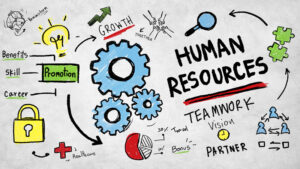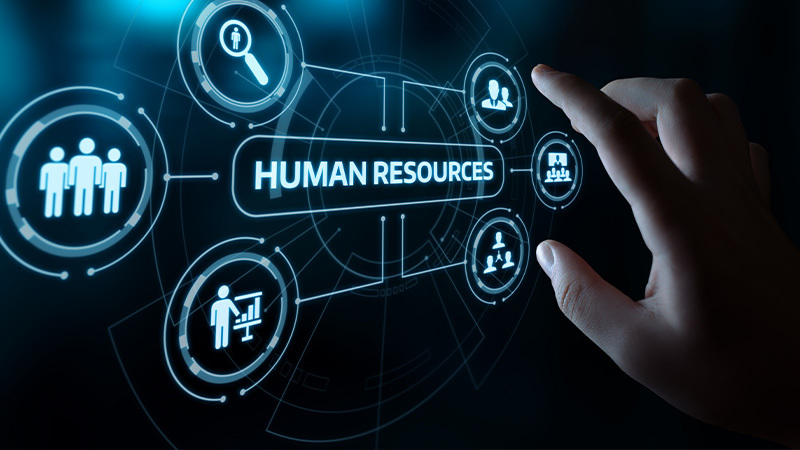
Exploring the Transformative Power of HR Online
HR Online platforms have revolutionised the way businesses manage their human resources. These digital solutions have significantly transformed traditional HR practices, creating more streamlined, efficient, and scalable systems for managing employees. This article will delve into the world of HR Online, uncovering its benefits, technological advancements, challenges, implementation strategies, and future trends.
Streamlining HR Processes
HR Online platforms have revolutionised the way businesses manage their human resources. These digital solutions bring a multitude of benefits, significantly streamlining various HR processes, making them more efficient and effective. Here, we’ll delve deeper into these advantages.
Improved Recruitment Strategies
Recruitment is the lifeblood of any organisation, and HR Online platforms have transformed this crucial aspect. These platforms offer a range of features that assist in sourcing, screening, and hiring suitable candidates with unprecedented ease and precision.
Efficient Candidate Sourcing: HR Online tools provide access to vast talent pools through job boards, social media, and professional networks. This expanded reach ensures a diverse selection of potential candidates.
Automated Resume Screening: The time-consuming process of sifting through countless resumes is streamlined by automated screening algorithms. These algorithms can identify the most relevant candidates, saving HR professionals countless hours.
Streamlined Interview Scheduling: HR Online platforms often include interview scheduling tools that simplify the coordination of interviews, ensuring that the right candidates are brought in for discussions.
Assessment and Testing: Some platforms offer integrated testing and assessment modules, allowing HR teams to evaluate candidates’ skills and compatibility with the job requirements.
Efficient Onboarding Procedures
Once a candidate is hired, smooth onboarding is critical to ensure they integrate seamlessly into the company’s culture and operations. HR Online platforms play a pivotal role in facilitating this process.
Digital Documentation: Paperwork becomes a thing of the past with digital onboarding. New employees can complete all necessary forms and agreements online, reducing administrative burdens.
Training and E-Learning: Many HR Online systems include e-learning modules, allowing new hires to access training materials and resources, ensuring they are well-prepared for their roles.
Task Assignments: HR platforms can assign tasks and responsibilities to various teams or individuals, ensuring that the onboarding process proceeds smoothly and that nothing is overlooked.
Feedback and Communication: These platforms often offer channels for new employees to provide feedback and ask questions, creating a sense of belonging and fostering a positive first impression.
Employee Management and Engagement

HR Online systems go beyond recruitment and onboarding; they also offer tools for effective employee management and engagement.
Digital Records: Storing employee records digitally makes it easier to access and update crucial information, ensuring that all employee data is accurate and up-to-date.
Performance Evaluation: HR platforms often include performance evaluation features, making it simpler for managers to track employee progress and provide feedback.
Employee Self-Service: Many platforms offer self-service options, enabling employees to update personal information, access pay stubs, and request time off without HR intervention.
Engagement Surveys: Some HR systems incorporate employee engagement surveys, which are valuable for understanding the workforce’s sentiment and identifying areas for improvement.
Communication Tools: These platforms may also provide communication tools, allowing HR departments to share important announcements, policies, and updates with the workforce.
Leveraging Tech for HR Advancements
The rapid advancement of technology has had a profound impact on the field of Human Resources, and HR Online platforms are at the forefront of this transformative journey. These platforms are no longer just repositories of employee information; they have evolved into intelligent systems that enhance decision-making, automate routine tasks, and drive organisational success. Let’s delve deeper into the role of technology in HR advancements.
AI and Automation in HR
Artificial Intelligence (AI) is a game-changer in HR. HR Online platforms now incorporate AI-driven tools that revolutionise recruitment processes. AI algorithms can analyse resumes, matching candidates with job descriptions, and even conducting initial interviews. This not only saves time but also ensures that the hiring process is more objective and data-driven, reducing the chances of bias.
Automation, another hallmark of modern HR technology, streamlines various HR processes. Mundane tasks such as payroll processing, time and attendance tracking, and benefits administration can be automated, freeing HR professionals to focus on strategic activities. This not only increases efficiency but also reduces the likelihood of errors.
Data-Driven Decision Making in HR Practices
The power of data in HR cannot be overstated. HR Online platforms offer advanced analytics capabilities, allowing HR professionals to make decisions based on empirical evidence. For instance, these platforms can provide insights into employee turnover rates, helping companies identify patterns and take preventive measures. Predictive analytics can forecast future HR trends, enabling proactive action rather than reactive responses.
The use of data analytics extends to employee performance evaluations as well. By tracking employee performance metrics over time, HR professionals can identify high performers, offer tailored development opportunities, and address performance issues promptly. This data-driven approach to HR not only improves employee satisfaction but also contributes to organisational success.
Security and Compliance Aspects in HR Tech
The increasing reliance on technology in HR also brings forth security and compliance concerns. HR Online platforms deal with sensitive information, including employee personal data, financial records, and healthcare information. As such, robust security measures are essential to protect this data from breaches and cyberattacks.
Moreover, the ever-evolving landscape of data privacy regulations, such as the General Data Protection Regulation (GDPR) in Europe, requires HR tech solutions to be compliant. Ensuring that HR Online platforms adhere to these regulations is a top priority. Companies need to implement strong data encryption, access controls, and regular security audits to safeguard sensitive information and maintain legal compliance.
HR Online platforms have harnessed the power of technology to revolutionise HR practices. AI and automation streamline processes, data-driven decision making enhances HR strategies, and a strong focus on security and compliance ensures that sensitive data remains protected. As businesses continue to embrace these technological advancements, the future of HR promises greater efficiency, objectivity, and success in managing the most valuable asset of any organisation – its people
Addressing Challenges in HR Online
While HR Online brings numerous benefits, it’s not without challenges. Data security concerns continue to be a priority, especially in an era where cyber threats are rampant. Managing remote teams effectively and overcoming integration hurdles when adopting new HR tech remain key challenges that companies face.
The Future Landscape of HR Online
As businesses continually evolve, so does the field of HR Online. This section will explore in greater detail the upcoming trends and transformations that we can expect to see in the HR technology landscape.
Predictive Analytics in HR
The future of HR Online holds the promise of predictive analytics, a cutting-edge technology that is set to reshape the way companies manage their human resources. Predictive analytics leverages historical data and machine learning algorithms to forecast future trends in HR. This entails predicting employee turnover, identifying potential performance issues, and even pinpointing areas of improvement in talent acquisition.
For instance, HR teams can use predictive analytics to foresee attrition rates and take proactive steps to retain top talent. This not only saves on recruitment costs but also contributes to a more stable and motivated workforce. Additionally, these predictive tools can help identify high-potential employees, enabling organizations to nurture and promote talent more effectively.
Personalisation of HR Services
In the future, personalisation will be at the core of HR Online platforms. The one-size-fits-all approach will give way to customised HR services tailored to the unique needs and preferences of individual employees. This shift towards personalisation will empower employees to access HR resources that are relevant to them, ensuring a more engaged and satisfied workforce.
Imagine an HR platform that provides each employee with a personalised dashboard, offering resources ranging from career development opportunities to health and wellness programs, all based on their specific interests and needs. This level of personalisation not only enhances employee engagement but also fosters a sense of belonging and commitment to the organisation.
Sustainability and Inclusivity in HR Practices
As the world becomes more environmentally and socially conscious, HR Online will reflect these changing values. Sustainability and inclusivity will take center stage in HR practices. Companies will focus on creating diverse, equitable, and inclusive workplaces, ensuring that every employee feels valued and has equal opportunities for growth.
HR platforms will integrate features that support sustainability initiatives, such as carbon footprint reduction, energy conservation, and eco-friendly work practices. Additionally, they will provide tools for tracking and improving diversity and inclusion metrics, making it easier for organisations to address disparities and create more equitable work environments.
The future landscape of HR Online is brimming with exciting possibilities. Predictive analytics will empower HR professionals to make informed decisions, personalisation will create more engaged employees, and a focus on sustainability and inclusivity will foster a socially responsible corporate culture. As businesses adapt to these evolving trends, they’ll find themselves better equipped to navigate the ever-changing world of work.
If you have any specific questions or would like to explore a particular aspect of this future landscape in more detail, feel free to ask.
Conclusion
HR Online is a transformative force in modern business practices, reshaping how companies manage and engage with their employees. While it presents challenges, the benefits far outweigh the obstacles. Understanding and effectively implementing HR Online strategies will be a key differentiator for businesses looking to thrive in the ever-evolving corporate landscape.
FAQs
1. What are the key features to look for in HR Online platforms?
2. How can HR Online tools improve employee engagement?
3. What challenges do companies face when implementing HR Online strategies?
4. Will AI completely replace human decision-making in HR practices?
5. How can companies ensure the security of sensitive HR data in online systems?
This article aims to provide a comprehensive overview of HR Online, from its inception to future trends, catering to businesses seeking to optimise their HR strategies and systems.
Is there anything specific you’d like me to expand on or any additional areas you’d like to be included in this article?







